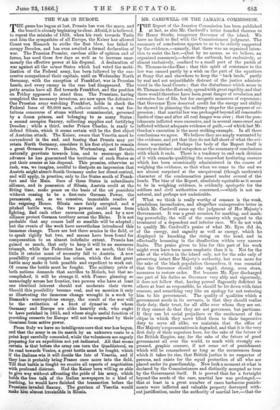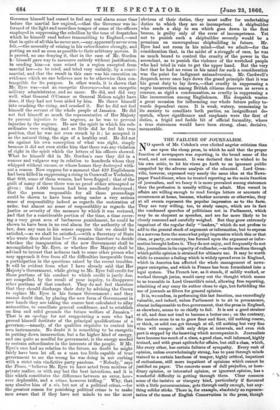MR.CARDWELL ON THE JAMAICA COMMTSSION. T HE Report of the Jamaica
Commission has been published at last, as also Mr. Cardwell's letter founded thereon to Sir Henry Storks, temporary Governor of the island. We have no fault to find with the Commissioners' judgment. The summary of conclusions appears to us to be strictly supported by the evidence,—namely, that there was an organized inten- tion to resist the law,—(but by no means, as we believe, an organized massacre),—before the outbreak, but exclusively, or almost exclusively, confined to a small part of the parish of St. Thomas-in-the-East ; that this spirit of resistance to the law was caused partly by a wish on the part of the squatters at Stony Gut and elsewhere to keep the "back lands," partly by real and not unjustifiable distrust of the justice adminis- tered in the local Courts ; that the disturbance which arose in St. Thomas-in-the-East only, spread with great rapidity, and that there would therefore have been great danger of revolution and extensive loss of life, but for energetic measures of repression; that Governor Eyre deserved credit for the energy and ability he showed in planning the military steps for the purpose of re- pression; that martial law was prolonged beyond all reasonable limits of time and after all real danger was over ; that the pun- ishments inflicted were excessive, and in several eases cruel and inflicted without adequate evidence of guilt,—of which last Mr. Gordon's execution is the most striking example. In all these conclusions we agree. We believe they are amply warranted by the evidence, and yet that they do not fall short of what the evi- dence warranted. Perhaps the body of the Report itself is scarcelyas distinct and outspoken as the summaryof conclusions with which it ends. There is a tendency to end each division of it with remarks qualifying the somewhat hesitating censure which has been occasionally administered in the course of weighing the evidence, so that when we come to the end we are almost surprised at the unequivocal (though moderate) character of the condemnation passed under several of the heads. The bias of the Report, absolutely equitable as it seems to be in weighing evidence, is evidently apologetic for the soldiers and civil authorities concerned,—which is not un- natural, and perhaps not undesirable.
What we think is really worthy of censure is the weak, pendulous, inconclusive, and altogether unimpressive letter in which Mr. Cardwell sums up the judgment of Her Majesty's Government. It was a great occasion for marking, and mark- ing powerfully, the will of the country with regard to the treatment of a dependent and inferior race. We do not wish to qualify Mr. Cardwell's praise of what Mr. Eyre did do, of the energy, and sagacity as well as energy, which he displayed in knocking the rising on the head, and in effectually hemming in the disaffection within very narrow limits. The praise given to him for this part of his work might even have been more emphatic than it is. Not for the sake of the whites in the island only, not for the sake only of preserving intact Her Majesty's authority, but even more for the sake of the black population themselves, it was essential that the Governor should take rapid, strong, even stern, measures to restore order. But because Mr. Eyre discharged one part of his duties as Governor very ably and vigorously, it does not follow that, having proved flagrantly deficient in others at least as responsible, he should be let down with faint censure, and something very like an apology for not restoring him to his government. The quality of qualities which a government needs in its servants, is that they should realize their duty, their trust, for all alike over whom they are set. If they cannot do that they are not governors, but partizans. If they can let social prejudices or the excitement of the cliltie in which they move blind them to their imperative duty to serve all alike, we maintain that the office of Her Majesty's representatives is degraded, and that it is the very first duty of their superiors here, for the sake of the future of the British Empire, nay, for the sake of the future of good government all over the world, to mark with strongly ex- pressed, graphic censure, if not some act of punishment which will be remembered as long as the occurrences from which it takes its rise, that British justice is no respecter of persons, and exists for the equal protection of all who are placed under its guardianship. Now look a moment at what is declared by the Commissioners and distinctly accepted as true by the Government itself. It is proved that for a fortnight beyond the needs of the case, martial law was prolonged,— that at least in a great number of cases barbarous punish- ments were inflicted and valuable property destroyed with- out justification, under the authority of martial law,—that the Governor himself had ceased to feel any real alarm some time before the martial law expired,—that the Governor was in- formed of the light and merciless temper of some of the officers employed in suppressing the rebellion by the tone of despatches which he himself read before transmitting to England,—and that in spite of all this he never saw, —nay, apparentlynever even felt,—the necessity of reining in his subordinates strongly, and putting an end as soon as possible to their arbitrary powers. It is proved, no one denying it, that in the case of Mr. Gordon h 3 himself gave way to measures entirely without justification, in sending him—a man seized in a region excepted from martial law—to be tried, and tried very unfairly, by a court- martial, and that the result in this case was his execution on evidence which no one believes now to be otherwise than con- temptible for its purpose. In other words, it is shown that Mr. Eyre was—not an energetic Governor—but an energetic military administrator, and no more. He did, and did very well, what General O'Connor or General Nelson might have done, if they had not been aided by him. He threw himself into crushing the rising, and crushed it. But he did not feel himself the servant of the whole people of Jamaica. He did not feel himself as much the representative of Her Majesty to prevent injustice to the negroes, as he was to prevent injustice by the negroes. He saw the spirit in which his sub- ordinates were working, and so little did he feel his true position, that he was not even struck by it ; he accepted it as the natural thing, the sign of a healthy zeal. He did not sin against his own conception of what was ...right, simply because it did not even strike him that there was any violation of right in the spirit which the letters of his officers showed. What he himself did in Mr. Gordon's case they did in a coarser and vulgarer way in relation to hundreds whom they whipped without excuse, or whose homes they destroyed with- out a reason-. Now suppose for a moment that 439 Englishmen had been killed in suppressing a rising in Cornwall or Yorkshire, that 600, some of them women, had been flogged ; that of the guilt of many of these there was no proof either attempted or given ; that 1,000 houses had been needlessly destroyed ; that the person responsible for all these proceedings could be shown to have been acting under a very serious sense of responsibility indeed as regards the restoration of order, but almost no sense of responsibility as regards the justice or severity of the measure by which it was restored, and that for a considerable portion of the time, a time cover- ing a very great area of barbarous punishment, he could be shown to have been in no real alarm for the authority of the law, does any man in his senses suppose that we should be satisfied,—as we shall be satisfied,—with a Secretary of State who wrote thus about him ?—" It remains therefore to decide whether the inauguration of the new Government shall be accomplished by Mr. Eyre, or whether Her Majesty shall be advised to intrust that arduous task to some other person who may approach it free from all the difficulties inseparable from a participation in the questions raised by the recent troubles. It will be evident from what I have already said that Her Majesty's Government, while giving to Mr. Eyre full credit for those portions of his conduct to which credit is justly due, are compelled, by the result of your inquiry, to disapprove other portions of that conduct. They do not feel therefore that they should discharge their duty by advising the Crown to replace Mr. Eyre in his former Government ; and they cannot doubt that, by placing the new form of Government in new hands they are taking the course best calculated to allay animosities, to conciliate general confidence, and to establish on firm and solid grounds the future welfare of Jamaica." That is an apology for not reappointing a man who had proved himself destitute of the principal qualifications of a governor,—namely, of the qualities requisite to control his own instruments. No doubt it is something to be energetic in putting down insurrection, but a far higher kind of energy, and one quite as needful for government, is the energy needed to restrain subordinates in the interests of the people. If. Mr. Eyre's case had no relation to the future, no doubt he might fairly have been let off, as a man too little capable of true government to see the wrong he was doing in not curbing with a strict rein vindictive party passions. "Nobody," says the Times, "believes Mr. Eyre to have acted from motives of private malice, or with any but the best intentions, and it is this which constitutes the difference between an error, how- ever deplorable, and a crime, however trifling." Why, thak may absolve him of a sin, but not of a political crime,—f or the greatest reason for punishing political crime is to make men aware that if they have not minds to see the most obvious of their duties, they must suffer for undertaking duties to which they are so incompetent. A shipbuilder who sends a ship to sea which goes down in the first breeze, is guilty only of the error of incompetence. Yet not to punish such a shipbuilder severely would be a premium on unscrupulous shipbuilding in future. Mr. Eyre had not room in his mind—that we admit—for the consideration that, in the midst of a struggle of race, he was as much bound to control the cruelty of the power in the ascendant, as to punish the violence of the wretched people who had tried in vain to get the upper hand. But the very fact that he had no room in his mind for such a consideration was the point for indignant animadversion. Mr. Cardwell's despatch never once lays down the grand principle that it was his great duty to lay down,—that cruelty in suppressing a negro insurrection among British citizens deserves as severe a censure, as rigid a condemnation, as cruelty in suppressing a like insurrection among Englishmen. His despatch wastes , a great occasion for influencing our whole future policy to- wards dependent races. It is weak, watery, unmeaning in its anxiety to conciliate both parties, an insignificant de- spatch, where significance and emphasis were the first of duties, a frigid and feeble bit of official formality, where a true statesman would have been strong, clear, decisive, memorable.































 Previous page
Previous page